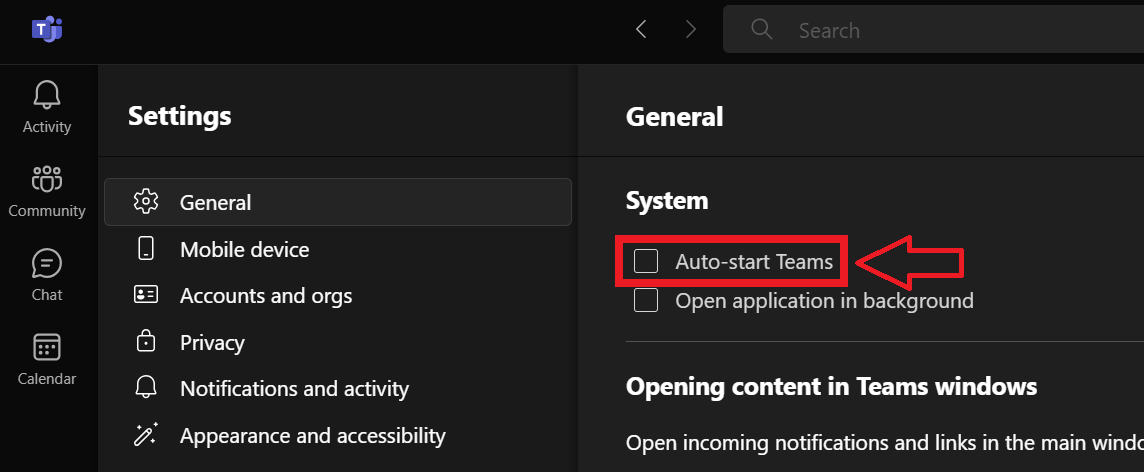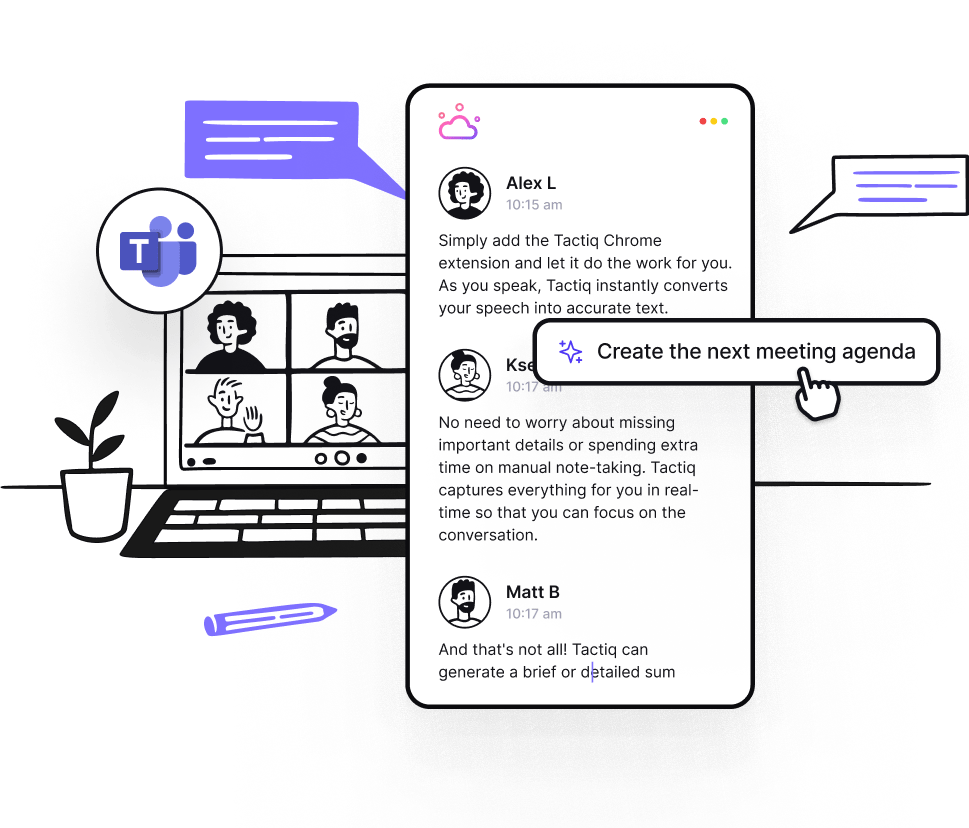Stop Microsoft Teams from Opening Automatically
September 13, 2024
September 13, 2024
June 12, 2025
June 12, 2025
Ever wondered why Microsoft Teams keeps popping up every time you start your computer? You're not alone. Many users find this default behavior annoying and are often left seeking solutions to stop it. Let's explore why this happens and how it affects your system.
For more insights into Microsoft Teams, check out these related articles: Top Microsoft Teams Alternatives in 2024, Microsoft Teams vs Google Meet: A Detailed Comparison, and Zoom vs Microsoft Teams: Pros and Cons for Businesses.
Impact of Microsoft Teams on System Performance
When the Microsoft Teams app opens automatically, it uses system resources right from the start. This can slow down your computer. Here are some ways it impacts performance:
- Memory Usage: Teams consumes RAM, reducing the amount available for other applications.
- CPU Load: It takes up CPU cycles, which can make your system sluggish.
- Boot Time: Additional startup applications increase the time it takes for your computer to become usable.
User Concerns and Frustrations with Automatic Startup
Many users find the automatic startup of Microsoft Teams intrusive. Here are common complaints:
- Disruption: Teams windows can disrupt your workflow as you log in.
- Inconvenience: Having to manually close Teams every time you start your computer is annoying.
- Privacy: Teams might log you in automatically, which could be a concern if you share your computer.
How to Stop Microsoft Teams from Opening on Startup
To stop Microsoft Teams from opening automatically, you can change the settings within the app itself. Follow these steps:
- Open Microsoft Teams: Launch the app and log in if required.
- Access Settings: Click the three dots (ellipsis) in the top-right corner.
- Select Settings: From the dropdown menu, click "Settings."
- Disable Auto-Start: In the "General" tab, find the option labeled "Auto-start application" and uncheck the box to disable Microsoft Teams from opening on startup.

Alternative Methods Using Windows Task Manager
You can also disable Teams from starting automatically using the Windows Task Manager. Here’s how:
- Open Task Manager: Press Ctrl + Shift + Esc or right-click the taskbar and select "Task Manager."
- Go to Startup Tab: Click on the "Startup Apps" tab to see a list of programs that start with Windows.
- Locate Microsoft Teams: Find "Microsoft Teams" in the list.
- Disable: Right-click on "Microsoft Teams" and select "Disable."
Addressing Persistent Issues and Troubleshooting Tips
Sometimes, Teams may re-enable itself or the above methods may not work due to specific system configurations. Here are some troubleshooting tips:
- Check for Updates: Ensure that both Windows and Microsoft Teams are up to date. Sometimes, updates fix bugs related to startup settings.
- Uninstall and Reinstall: If Teams continues to auto-start, try uninstalling and then reinstalling the app. This can reset any corrupted settings.
- Seek Help: If all else fails, consult Microsoft Support or community forums for specific advice related to your setup.
Pro Tip: Regularly review your startup programs to maintain optimal system performance.
Stopping Microsoft Teams from opening on startup can significantly improve your computer's performance and streamline your workflow. Use these methods to take control of your startup applications.
What are the Long-Term Solutions to Prevent Automatic Startup?
Uninstall Microsoft Teams as an Option
If you rarely use Microsoft Teams and it's causing more hassle than help, consider uninstalling it. This will stop it from opening automatically and free up system resources.
- Open Settings: Press Windows + I to open the Settings menu.
- Go to Apps: Click "Apps" and then select "Apps & features."
- Find Microsoft Teams: Scroll through the list or use the search bar to locate "Microsoft Teams."
- Uninstall: Click on Microsoft Teams and select "Uninstall."
Note: This is a drastic measure, so make sure you don't need the app for any future tasks.
Using Third-Party Startup Management Tools
Third-party tools can offer more control over startup applications than built-in Windows settings. These tools often provide additional features like detailed system performance metrics and one-click optimization.
- Autoruns: Developed by Microsoft, this tool provides a comprehensive view of all startup items.
- CCleaner: Popular for system optimization, CCleaner includes a startup manager feature.
- Startup Delayer: This tool lets you delay the startup of applications, spreading the load over time.
Advantages: These tools are often more user-friendly and offer advanced features compared to default Windows settings.
Ensuring User Settings are Retained Across Updates
Sometimes, updates can reset your preferences, causing Teams to start automatically again. Here’s how to ensure your settings stick:
- Backup Settings: Before updating, make a note or take screenshots of your current settings.
- Review Post-Update: After updating, review your settings to ensure nothing has changed.
- Use Group Policies: For advanced users, Group Policies can enforce settings across updates. This is especially useful in a corporate environment.
Implementing these long-term solutions can help you prevent Microsoft Teams from starting automatically, ensuring a smoother and more efficient computing experience.
{{rt_cta_ai-convenience}}
How Tactiq Can Help Manage Microsoft Teams and Improve Productivity

Tactiq is a meeting tool designed to enhance productivity by automating note-taking and providing real-time transcriptions within Microsoft Teams. It also simplifies post-meeting tasks through AI-powered features like summaries, action items, and follow-up emails.
Here’s how Tactiq can transform your Microsoft Teams meetings:
- Live Transcriptions & AI Summaries: Automatically transcribes conversations during meetings and provides AI-generated summaries, so you don’t miss key points.
- AI Meeting Kits: Use customizable AI prompts to automate tasks like follow-up emails or creating Jira tickets, making post-meeting work faster and more efficient.
- Customizable AI Prompts: Ask tailored AI prompts to analyze meeting content and provide deeper insights, then save these prompts to build a personalized AI library.
- Actionable Follow-Ups: Tactiq automates the creation of detailed follow-up emails and task lists based on the discussion, saving you time on manual follow-up work.
By leveraging Tactiq’s robust features, you can transform your Microsoft Teams meetings into highly organized and productive sessions. Download the free Tactiq Chrome Extension today!
Microsoft Teams is set by default to launch at startup, which uses your computer’s memory and processing power right away. This can slow down your system and disrupt your workflow as soon as you log in.
You can disable Teams’ auto-start by opening the app, going to Settings via the three-dot menu, and unchecking the 'Auto-start application' box in the General tab. This prevents Teams from launching automatically, so your computer starts up faster and you avoid unnecessary interruptions.
If Teams still opens on startup, check for updates, try uninstalling and reinstalling the app, or use Windows Task Manager to disable it under the Startup Apps tab. These steps help ensure your settings stick and your workflow remains smooth.
You can uninstall Teams if you rarely use it, or use third-party tools like Autoruns or CCleaner for more control over startup programs. These options free up system resources and give you lasting control over what runs when your computer starts.
Tactiq automates note-taking and provides real-time transcriptions and AI-generated summaries during Teams meetings. This means you capture every key point and save time on follow-ups, making your meetings more productive and actionable.
Want the convenience of AI summaries?
Try Tactiq for your upcoming meeting.
Want the convenience of AI summaries?
Try Tactiq for your upcoming meeting.
Want the convenience of AI summaries?
Try Tactiq for your upcoming meeting.









